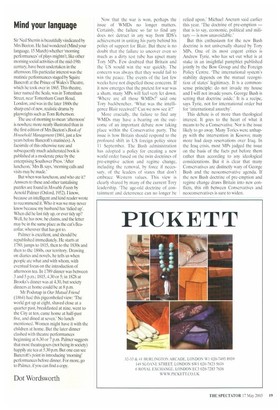Mind your language
Sir Ned Sherrin is beautifully vindicated by Mrs Beeton. He had wondered (Mind your language, 15 March) whether 'morning performances' of plays mightn't, like other morning social activities of the mid-19th century, have been undertaken in the afternoon. His particular interest was the matinee performances staged by Squire Bancroft at the Prince of Wales's Theatre, which he took over in 1865. This theatre, later named the Scala, was in Tottenham Street, near Tottenham Court Road, London, and was in the later 1860s the sharp end of new, realistic drama by playwrights such as Tom Robertson.
The use of morning to mean 'afternoon' is nowhere more neatly illustrated than in the first edition of Mrs Beeton's Book of Household Management (1861, just a few years before Bancroft's matinees). A facsimile of this otherwise rare and subsequently much adulterated book is published at a moderate price by the enterprising Southover Press. 'After luncheon,' Mrs B. says, 'morning calls and visits may be made.'
But when was luncheon, and who ate it? Answers to these and other tantalising pu7.71es are found in Movable Feasts by Arnold Palmer (Oxford, 1952). I know, because an intelligent and kind reader wrote to recommend it. Who it was we may never know because my husband has 'tidied up'. When did he last tidy up, or ever tidy up? Well, he has now, he claims, and the letter may be in the same place as the cat's fleacollar, wherever that has got to.
Palmer is excellent, and should be republished immediately. He starts at 1780, jumps to 1815, then to the 1830s and then to the 1860s, our territory. Drawing on diaries and novels, he tells us when people ate what and with whom, with eventual focus on the introduction of afternoon tea. In 1789 dinner was between 3 and 5 p.m.; 1815,4.30 or 5; in 1828 at Brooks's dinner was at 4.30, but society dinners at home could be at 8 p.m.
Mr Podsnap in Our Mutual Friend (1864) had this pigeonholed view: The world got up at eight, shaved close at a quarter past, breakfasted at nine, went to the City at ten, came home at half-past five, and dined at seven.' No lunch mentioned. Women might have it with the children at home. But the later dinner clashed with theatre performances beginning at 6.30 or 7 p.m. Palmer suggests that most theatregoers (not being in society) happily ate tea at 5.30 p.m. But one can see Bancroft's point in introducing 'morning' performances before dinner. For more, go to Palmer, if you can find a copy.
Dot Wordsworth


































































































 Previous page
Previous page